Wondering when is the best time to take a pregnancy test? Here’s everything you need to know about home pregnancy tests, their accuracy, when is the best time to take one, and many more!
For many of you fellow women out there, taking a home pregnancy test can be a really stressful experience. Regardless if you desire to be pregnant or you’re not ready for that yet, the anxiety levels of the decision to “pee on a stick” are the same. And for a reason!
Even though home pregnancy tests have pretty much evolved, they can still be confusing if not used properly.
For example, if you decide to take a test too early, you’re at greater risk of getting a false negative result.
There are also factors than can influence getting a false positive result (which is less common).
And then is when you might start asking yourself: Am I pregnant or what? Should I start looking for the best rocking chairs for nursery or rather take another test?
In order to get an accurate reading, you need to know when the best time to take a pregnancy test is, how these tests work and other details related to tests and early pregnancy.
When Is The Best Time To Take A Pregnancy Test?
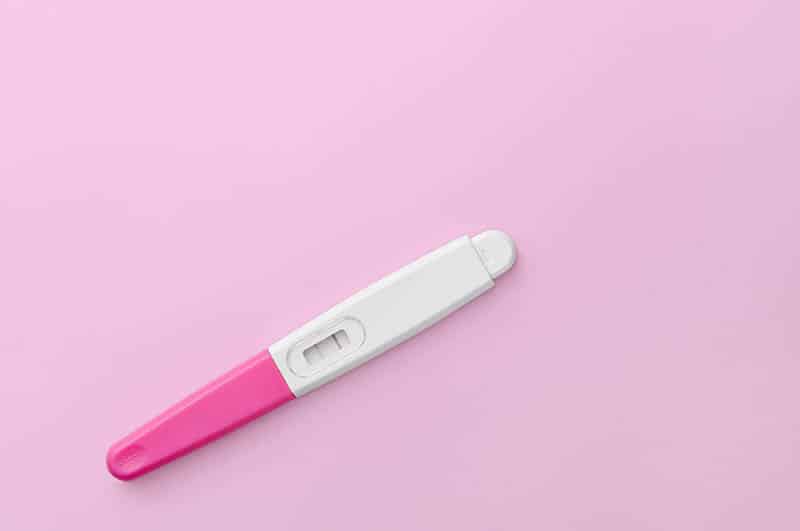
The best time to “pee on a stick” (take a pregnancy test) is after a missed period. Most pregnancy tests can be taken from the first day of a missed period.
Here’s why this is the ideal time for taking a pregnancy test:
Human chorionic gonadotropin (hCG) stands for the pregnancy hormone that is detected in your urine. In case you are pregnant, your body needs some time to produce the amount of hCG that is detectable.
So, once you take a pregnancy test, its accuracy depends on the levels of hCG in your urine.
If you take a test too early, you will not allow your body to produce enough pregnancy hormone (in case you’re pregnant) and this might result in a false negative.
Usually, the egg attaches six days after fertilization which will then increase the levels of hCG for the next six to ten weeks. hCG cannot be detected until implantation happens and the placenta starts to grow.
When that happens, the fertilized egg will start producing hCG (the pregnancy hormone).
If you have irregular periods, when is the best time to take a pregnancy test?
In case your cycles are irregular (like mine) or you (for some reason) don’t chart your menstrual cycles, it’s advisable that you don’t take a pregnancy test until the longest menstrual cycle you usually have has passed.
Let’s say that your cycles range from 32 to 37 days. Now, the ideal time to take a pregnancy test would be on day 38 (or later).
At what time is the best time to take a pregnancy test: morning or night?
I’m sure you’ve noticed how in movies women would always take pregnancy tests in the morning.
I never questioned the validity of this action but actually there is a reason why it is better to take the test in the morning than at night.
If you take a pregnancy test in the morning, it is more likely that you’ll get an accurate result.
Why? Because as you’re sleeping your urine becomes more concentrated (assuming that you won’t drink water during the entire night or pee often).
Because of that, in the morning the levels of hCG (pregnancy hormone) will be higher.
Still, you can take a pregnancy test during the day or at night if you so wish, but then you’ll be more at risk of getting a false-negative.
See also: 110 Most Beautiful Pregnancy Quotes For Moms To Be
6 Signs You Should Take A Pregnancy Test
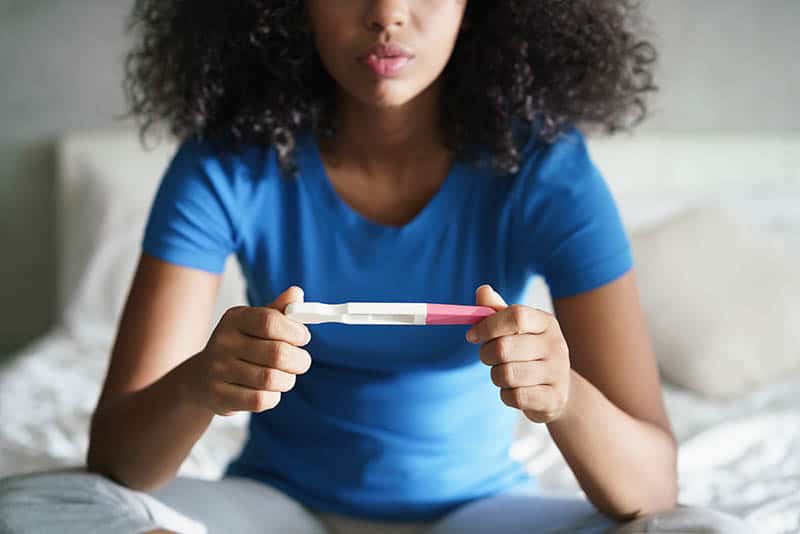
1. Missed period
A missed period is one of the most reliable early signs of pregnancy. That is why it is advisable that you track your menstrual cycle.
If your cycles are usually irregular, this can be really frustrating because the first thing that will come to your mind is: Maybe I’m pregnant.
Don’t get me mistaken. That’s a great thing in case you’re looking forward to being pregnant but if you’re not ready for it at the moment, then it can be a problem.
Also, keep in mind that there are various factors that can influence missed or late period such as stressful situations, exercise, your diet and other things.
If it’s been more than a month since you had your last period, then you should consider taking a pregnancy test.
Another thing you should pay attention to is spotting or light bleeding that you might mistake for a period. Light bleeding usually happens in the early weeks of pregnancy during implantation.
If you notice any irregularities regarding your bleeding pattern, don’t hesitate to contact your doctor.
2. Breast discomfort
Breast discomfort is also one of the early symptoms of pregnancy.
When you are pregnant, your body tends to produce more and more hormones (estrogen and progesterone) to support the baby’s development.
These hormones are responsible for all the changes happening to your body.
One of them is breast discomfort. If you’re pregnant, your breasts may feel more sensitive and appear swollen. This happens because of the increased blood flow.
Also, your nipples might be overly sensitive as well and hurt a lot. Now, it’s important to mention that this is also one of the symptoms related to period as well.
Note: In case you’re pregnant know that during the first days after you give birth to your child, you might experience breast engorgement.
3. You have mild cramps
I don’t know about you, but every time I’m about to get my period, I experience severe menstrual cramps that are simply unbearable.
If I ever have mild cramps, I will not even need to take a pregnancy test because it will be suspicious immediately.
Now, if you usually have mild cramps, know that they could be implantation cramps instead of the ones related to your period.
Also, a hard stomach in pregnancy is one of the most common body changes during pregnancy and it can happen at an early stage or later on.
4. Contraceptive failure
There is a saying: You can never be too sure.
Well, I also like to say that you can never be too safe. No matter what kind of birth control method you are using, there is always a chance that it might fail you.
Many women forget to take their birth control pills properly and on a daily basis. I mean, it can happen to anyone to forget to take a pill that day because our lifestyles are pretty much hectic.
If you are using condoms, there is a chance that they will break and tear. In some cases, they can be used incorrectly.
All these things lead to one major thing and that is excessive worrying (in case you don’t want to be pregnant).
If you’re worrying that your method of contraception might have failed you, it is advisable that you take a pregnancy test.
5. Frequent urinating
The urge to urinate frequently occurs about six to eight weeks after conceiving. This happens because your uterus (your womb) is growing and expanding which causes pressure to your bladder.
Because of that, you will feel the need to frequently urinate. In other words, you will spend more time seating on a toilet than anywhere else.
So, if you notice that this is happening to you, you should take a pregnancy in order to be one hundred percent sure whether you’re pregnant or not.
6. You’re feeling different both mentally and physically
In the early stages of pregnancy, women experience so many changes both mentally and physically. Some of them are:
• Mood swings: If you’re experiencing mood swings, you might find yourself crying for no reason, being overly happy and constantly shifting between wide array of moods. Mood swings also happen during PMS, so pay attention whether you’re experiencing other symptoms of early pregnancy as well:
• Sensitivity to smells: Things you used to enjoy before might become appalling to you all of a sudden because of being overly sensitive to smells. This is usually the case with food or drinks that have an intense smell like coffee, alcohol and similar.
• Morning sickness: You’ve probably noticed that whenever a woman vomits in the morning in the movie, we later find out that she’s pregnant. It’s funny that this “morning sickness” doesn’t only happen in the mornings, but it can happen in the middle of the day, at night or anytime.
• Fatigue and tiredness: If you’re pregnant, the levels of the hormone progesterone will significantly rise in your body which can cause tiredness and fatigue in the first weeks of pregnancy.
• Changing tastes in food: This is popularly known as pregnancy cravings where you have an abnormal desire for certain food combinations. When do pregnancy cravings start? They start in the first trimester of your pregnancy and sometimes they can last until delivery.
In addition, the amount, themes, and vividness of dreams in pregnancy are another indicator that you might want to take a pregnancy test in case you already haven’t.
How At-Home Pregnancy Tests Work?
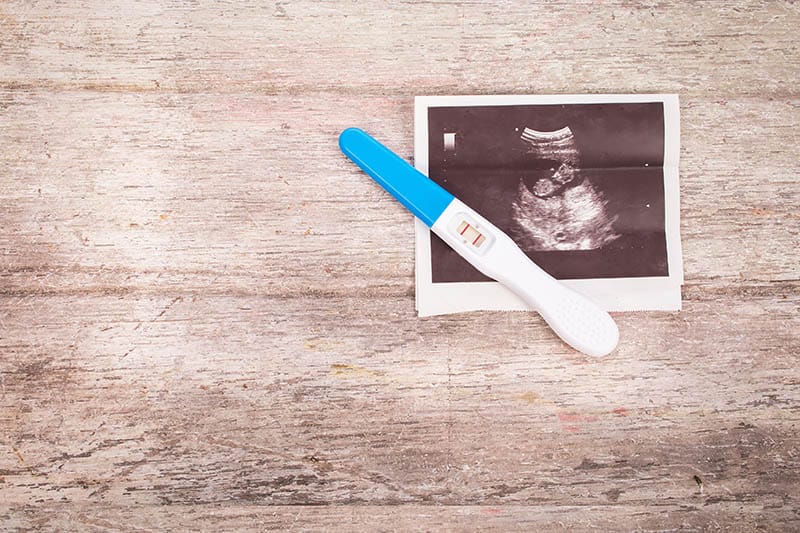
As already said, pregnancy tests work on the principle of detecting the pregnancy hormone called human chorionic gonadotropin (hCG) in your urine.
Urine tests can be taken at home or at the doctor’s office.
It’s important to note that a pregnancy test you do at home cannot measure the exact number of hCG hormone in your urine, but it can detect a minimum amount of it.
Different pregnancy tests from different brands may be better at detecting lower levels of hCG than others. It is always good to consult with your doctor or other experienced individuals at that field.
See also: 22 Pregnancy Must Haves For Expecting Moms In 2020
At-Home Pregnancy Test Accuracy
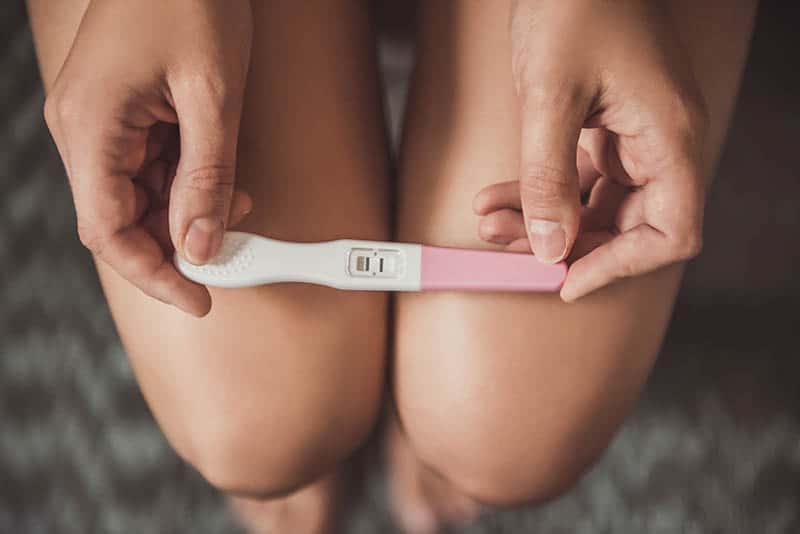
Most pregnancy tests promise 99% accuracy, but this is not necessarily the truth. There are some research studies claiming that these tests are only 46% to 89% accurate.
Also, you should keep in mind that there are some things that can mess with your pregnancy test such as fertility drugs containing hCG. This happened to one of my friends.
After “peeing on a stick” and getting a false positive result, she literally started looking for best shoes for pregnancy only to realize that she wasn’t even pregnant after all.
What about a false positive pregnancy test or false negative pregnancy test result?
In case you’ve been drinking a lot of water, chances are high that your test will appear false-negative.
Also, if you “pee on a stick” before your body has produced enough hCG, this could also end up in a false-negative because there won’t be enough levels of hCG to be detected in your pee.
To keep that from happening, avoid testing seven days after ovulation, but wait a little big longer.
There is also a thing known as a chemical pregnancy which happens when a fertilized egg never implants.
Note: If you take a pregnancy test and you get a faint line, chances are high that you might be pregnant.
Pros & Cons Of Early Testing
If you’re (for some reason) feeling tempted to take a pregnancy test before you find out that your period is late, here are some pros and cons of that decision:
Pros:
• There is a really small chance that you’ll get a positive result
• In case it is positive, it will alleviate some stress while you’re waiting to take another test
Cons:
• There is a high chance that you’ll get a false negative result in case you’re pregnant
• Experiencing feelings of disappointment due to negative test result
• Cost
• Potential detecting of an early miscarriage that you may have missed hadn’t you decided to test early
In case you decide to take an early test regardless of the above cons, you are probably wondering which one you should use.
One of the best early pregnancy tests is the First Response Early Result (FRER).
The First Response Early Result test has official authorization from the FDA to say that it is capable of detecting pregnancy hormones six days before your missed period.
Should You Get A Blood Test To Check If You’re Pregnant?
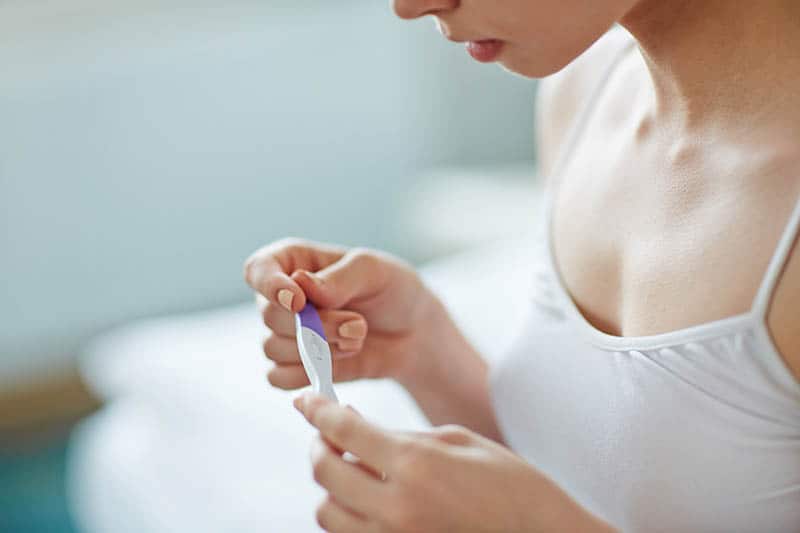
If you already “peed on a stick” and you got a positive or negative result, you’re probably wondering whether your should get a blood test as well.
This is your decision to make and I’ll only say that health care providers recommend taking blood tests in case you experienced a miscarriage or an ectopic pregnancy in the past.
Also, it is advisable that you take a blood test in case your period is late by a few days and you’re still getting negative results.
Even though it is not that common, but you can still be pregnant even if you get a negative test result on at-home pregnancy tests.
If this is the case with you, you should consult with your doctor and not just decide to get a blood test on your own.
If you’re wondering why, keep in mind that there are other potential reasons for missed or delayed period.
If you decide to get a blood test, you might want to know that there are two types of pregnancy blood tests:
• Qualitative tests: These tests measure if you have a minimum amount of hCG (pregnancy hormone) in your blood. The accent is on quality. They are pretty much straightforward and they give a simply yes or no to your question: Am I pregnant?
• Quantitative tests: On the contrary to qualitative tests, quantitative tests measure the amount of hCG (pregnancy hormone) in your blood. The accent is on quantity.
This type of test is often called hCG test. Quantitative tests are usually done for tracking the progress of pregnancy. You might take one test on Tuesday, and then the next test on Thursday of Friday.
The main reason why you would do that is to check whether the amount of pregnancy hormone is increasing as anticipated or not. If you had difficulties conceiving in the past, this can be really helpful.
Qualitative vs Quantitative tests
Now that we explained both, we need to declare a winner and the winner is quantitative blood tests. The reason why they are better is because a quantitative test measures the exact amount of pregnancy hormone in your blood.
See also: Get Prepped! The 36 Best Baby Things To Buy Before Birth In 2020
In Conclusion
So, let’s summarize all of the said above. When is the best time to take a pregnancy test?
The best time to take a pregnancy test is after your missed period in the morning. If you’re overly excited or anxious to see results ASAP, it’s totally understandable if you decide to take a pregnancy test earlier.
Before you decide to do that, consider the above potential disadvantages of taking an early pregnancy test.
If you’ve experienced a miscarriage or an ectopic pregnancy in the past, or if your period is late by a few days and the results keep showing negative it’s advisable that you get a blood test as well.
And if your positive pregnancy test is confirmed by both pregnancy test and your doctor, congratulations! (And don’t forget to use the pregnancy due date calculator.)
References:
- Gurevich, Rachel. When To Take A Pregnancy Test. Very Well Family. February 07, 2020.
READ NEXT: Symptoms, Causes, And Risks Of Cryptic Pregnancy
Like this post? Please share or pin it for later. You can also stay in the loop and follow us on Facebook, Instagram or Pinterest.

This post contains affiliate links. Please see our full disclosure for more info.

